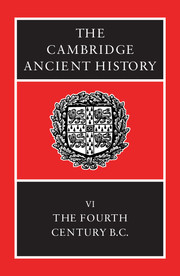Book contents
- Frontmatter
- 1 Sources and their uses
- 2 Sparta as victor
- 3 Persia
- 4 The Corinthian War
- 5 Sicily, 413–368 B.C.
- 6 The King's Peace and the Second Athenian Confederacy
- 7 Thebes in the 360s B.C.
- 8 Regional surveys I: Persian lands and neighbours
- 9 Regional surveys II: the West and North
- 10 Society and economy
- 11 The polis and the alternatives
- 12 Greek culture and science
- 13 Dion and Timoleon
- 14 Macedon and north-west Greece
- 15 Macedonian hegemony created
- 16 Alexander the Great Part 1: The events of the reign
- 17 Alexander the Great Part 2: Greece and the conquered territories
- 18 Epilogue
- Chronological Table
- BIBLIOGRAPHY
- Index
- Map 1: Greece and Western Asia Minor
- Map 9: Egypt
- Map 20: Alexanders campaigns
- References
14 - Macedon and north-west Greece
Published online by Cambridge University Press: 28 March 2008
- Frontmatter
- 1 Sources and their uses
- 2 Sparta as victor
- 3 Persia
- 4 The Corinthian War
- 5 Sicily, 413–368 B.C.
- 6 The King's Peace and the Second Athenian Confederacy
- 7 Thebes in the 360s B.C.
- 8 Regional surveys I: Persian lands and neighbours
- 9 Regional surveys II: the West and North
- 10 Society and economy
- 11 The polis and the alternatives
- 12 Greek culture and science
- 13 Dion and Timoleon
- 14 Macedon and north-west Greece
- 15 Macedonian hegemony created
- 16 Alexander the Great Part 1: The events of the reign
- 17 Alexander the Great Part 2: Greece and the conquered territories
- 18 Epilogue
- Chronological Table
- BIBLIOGRAPHY
- Index
- Map 1: Greece and Western Asia Minor
- Map 9: Egypt
- Map 20: Alexanders campaigns
- References
Summary
THE MACEDONIAN BACKGROUND
Macedonia had been by the middle of the fifth century a large and populous country:
… of Lower Macedonia the ruler was Perdiccas. The Macedonians however also encompass Lyncestae, Elimiotae and other upland tribes which, though allied and subject to them, have kings of their own. The coastal part of the country, known as Macedonia, was first won by Perdiccas’ father Alexander and his forebears, originally Temenids from Argos. They became sovereign over the land by defeating and expelling the Pierians … and the Bottiaeans and they acquired the narrow strip of Paeonian territory [Amphaxitis] running along the River Axius from inland to Pella and the sea; beyond the Axius they hold the area of Mygdonia as far as the Strymon … From the district now known as Eordaea they expelled the Eordaeans … and from Almopia the Almopians. These Macedonians also mastered, and still hold, a number of areas once belonging to other tribes: Anthemus, Crestonia, Bisaltia … The whole is now called Macedonia, and Perdiccas, son of Alexander, was its king” [in 429/8].
Thucydides’ summary (II. 99) well describes the kingdom at the death of Alexander I and during Perdiccas II's reign (c. 454–413).
Topographically Lower Macedonia might be described as a three-quarter circle centred approximately on the head of the Thermaic Gulf, which bites a substantial segment from its south-eastern quarter. Framing the alluvial coastal plain is an intermittent circuit of higher land and mountains, behind which a second and concentric ring of smaller plains is broken and confined by taller, more impenetrable ranges.
- Type
- Chapter
- Information
- The Cambridge Ancient History , pp. 723 - 759Publisher: Cambridge University PressPrint publication year: 1994
References
- 16
- Cited by

